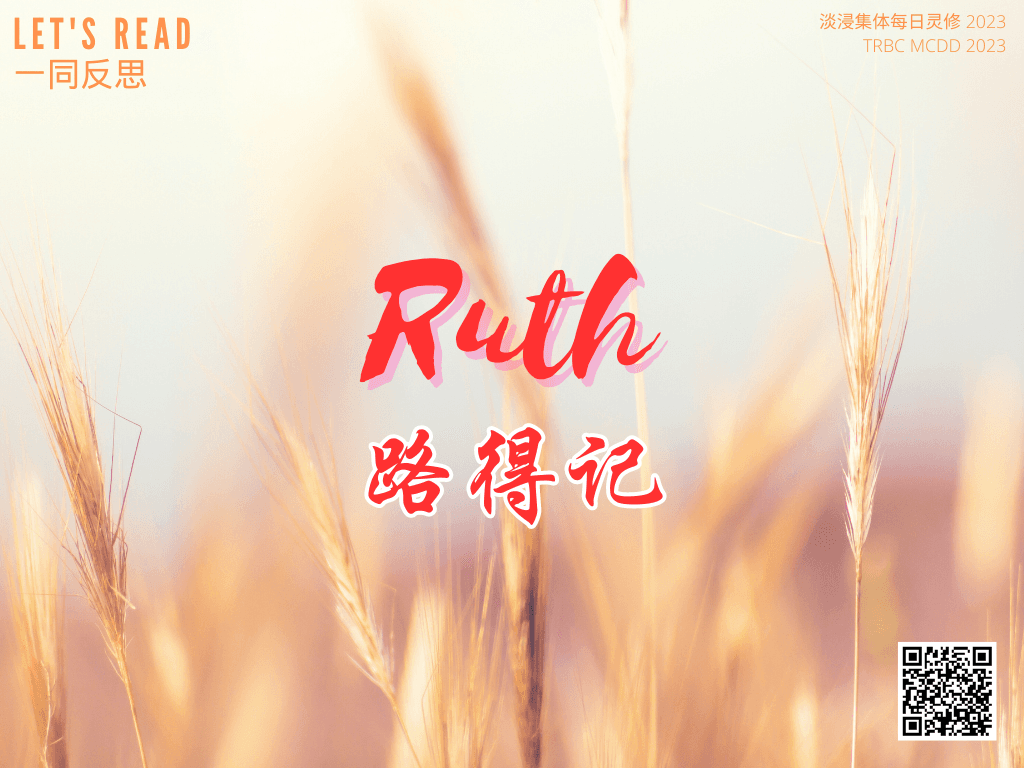Last 5 Days

Hesed

Click here to read Scripture
Chapter 2 narrates the development of Ruth and Boaz in the fields and we can read it in three parts. First, Ruth gleans in a field that happens to belong to Boaz, a relative (2:1-3), although it is a point of reflection on whether it is indeed “good fortune” or the hand of God. Second, Ruth and Boaz meet on the harvest field and Boaz is exceedingly generous (2:4-17a). Third, Naomi evaluates the meeting between Boaz and Ruth, and identifies Boaz as one of their kinsman-redeemers (2:17b-23).
In this quick review of the chapter, we also see the three characters of the book of Ruth, all of them seekers. First, Naomi was seeking comfort, from the death of her husband and two sons. She was hardly in a correct state of mind at the beginning of this chapter, too depressed, to advise her daughter-in-law to glean. Second, Ruth, who sought resolutely to support Naomi, at whatever risk that may expose her to as she gleans in the field. Ruth, the Moabite, had also abandoned the Canaanite gods and sought refuge in the God of Israel. Third, we can only imagine that Boaz might be seeking with some perplexity at how he should respond to Ruth, a poor, young, humble, hardworking Moabite, who seemed to be related to an Israelite. And what was shown through is that he showed kindness in return to Ruth’s kindness to her bereaved mother-in-law.
And Naomi said to her daughter-in-law, “May he be blessed by the Lord, whose kindness (hesed) has not forsaken the living or the dead!” Naomi also said to her, “The man is a close relative of ours, one of our redeemers.” ~Ruth 2:20
Boaz’s kindness to Ruth point towards the promise of blossoming into something more, and when Naomi named Boaz as a redeemer, the story plot starts to take a turning point. Naomi knows about the special obligations of a redeemer and she suddenly sees hope. Through the kindness of Boaz, Naomi understands the kindness of God to her, and to Ruth. God had allowed Ruth to meet their redeemer, Boaz, someone who is able and willing to meet their deepest needs. Once Naomi was “dead” (in her depressed state), but now she lives, because God showed kindness and mercy to her. And as we continue to discover more of the riches that Naomi and Ruth may experience in the next two chapters, we discover that the greatest treasure of the book of Ruth is truly the astonishing kindness (hesed) of God.
Hesed connotes altogether the notions of covenantal loyalty, faithfulness, kindness, goodness, mercy, love, and compassion, and it is mutual. The kindness (hesed) of God is shown through the characters of the book of Ruth, through the way they treat each other (Ruth’s determination to support Naomi, Boaz’s kindness towards Ruth). It is not in some religious setting that the kindness (hesed) is shown. It is in the fields, their daily workplace, where kindness may be lacking, that such kindness is being shown.
Today, as children of God, are we showing the hesed of God in our environments – homes, schools, or workplaces? Is there someone whom we can treat kindly, or with care? Can we show loyalty to a relationship and not be rumour bearers? When someone messes up, can we show mercy and compassion? How are we building relationships with people around us in such a way that we may be able to show God’s hesed to them? May our faith grow in the community we are in, as we experience God’s transforming work and kindness in our lives through our hesed to one another.
Prayer : Dear Lord, thank you for your grace, mercy, and kindness to me. Father, I love you, and I want to show the kindness you have shown to me to others around me as well. Help me, Lord, to show love, kindness, mercy, grace, compassion. In Jesus’ name I pray, Amen.
